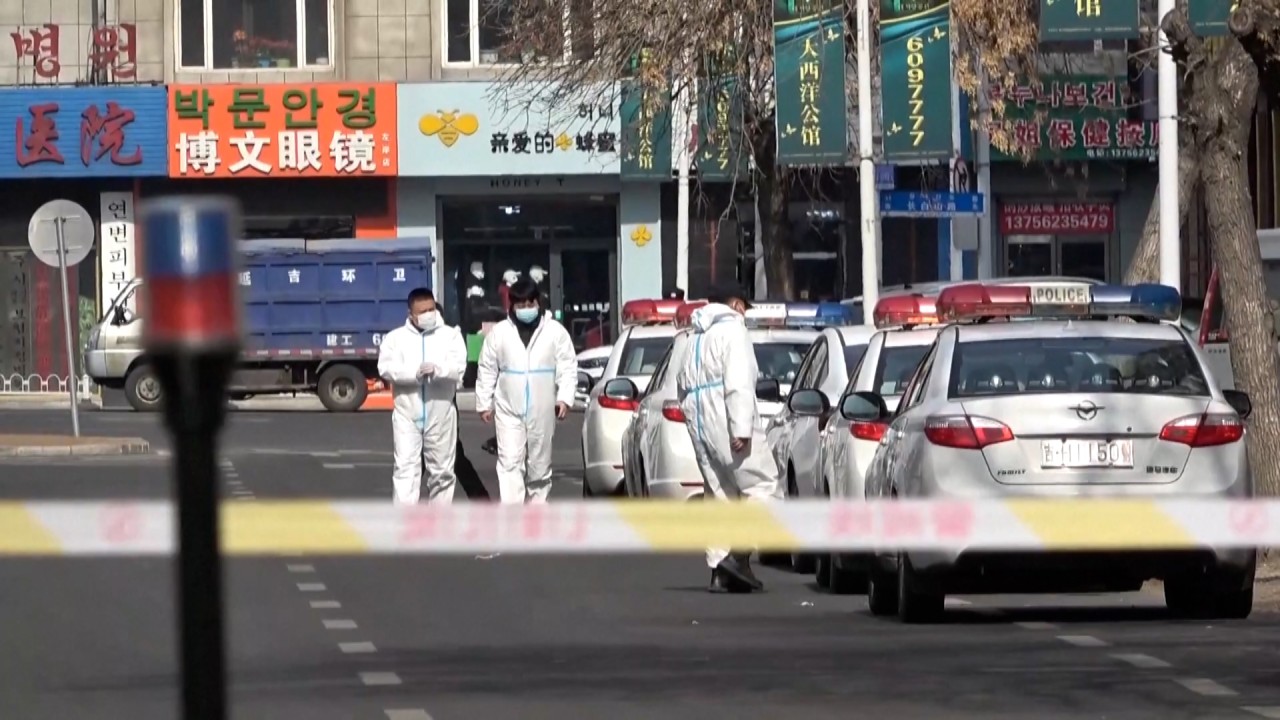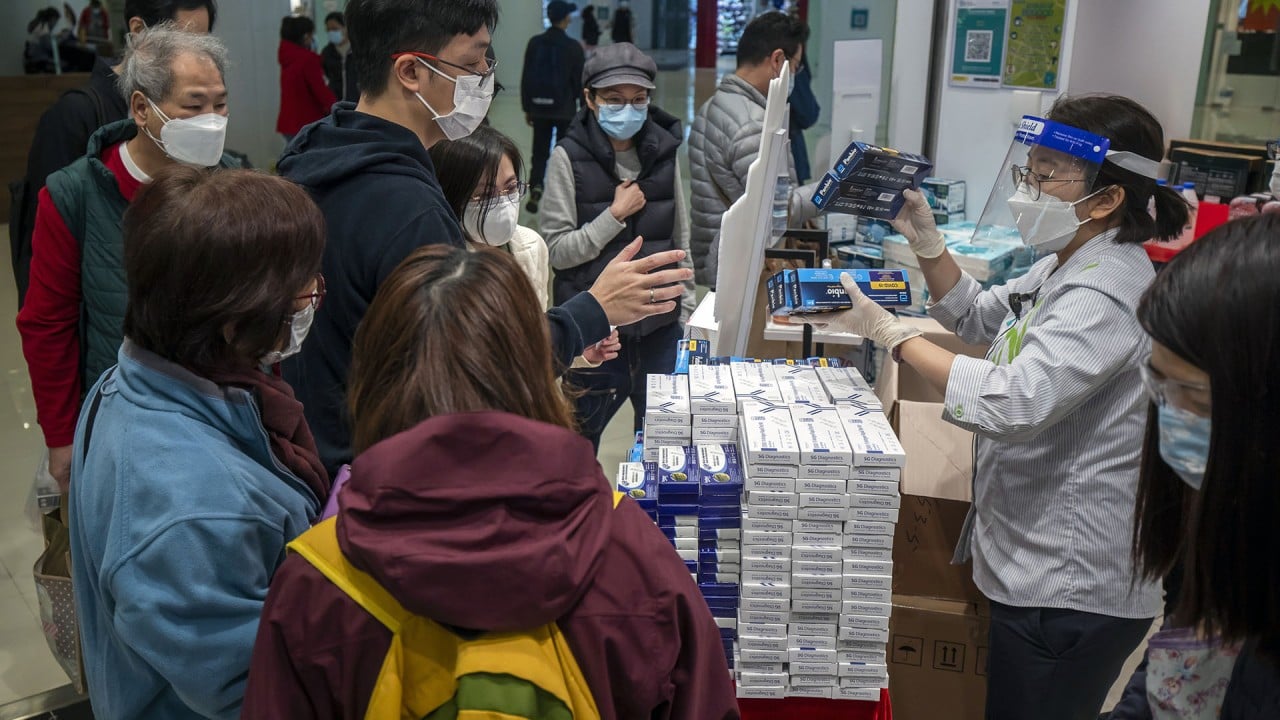
Covid-19: First of 1,000 medical workers from mainland China arrive in Hong Kong as death toll sets record
- Record 249 Covid-19 patients die in past 24 hours, but city leader says vaccination campaign that lagged for months contributed to fatalities
- Team of 75 mainland doctors, nurses and other health professionals will treat patients, but union warns difficulties in communication have already arisen
Chief Executive Carrie Lam Cheng Yuet-ngor pointed to the vaccination campaign that lagged for much of the past year as contributing to the death rate, which is the highest in the developed world, while a top official at the Hospital Authority (HA) said the focus now was on treating patients.
A record 249 Covid-19 patients died in the past 24 hours and 37 others in the days before – but were only reported on Monday due to a backlog – taking the overall tally to 4,279.
When asked about the figures, Lam insisted her government had “put in all the necessary effort in order to keep Hong Kong people safe”.

“We have spent over one year to promote, to encourage, to coerce people to take the jab, but unfortunately, partly because of the low infection rate in the last year or so, and partly because of anxiety and worries and so on, we have not achieved a high rate of vaccination, especially amongst the elderly, particularly amongst elderly in elderly homes,” she said.
“There are a lot of things in our city that should be revisited and we should take a critical look in order to prepare us for a future public health crisis.”
Dr Lau Ka-hin, a chief manager of the HA, added that officials were not focusing on death records, saying the goal was to prevent patients with only mild symptoms from worsening and serious cases turning into fatalities.
“This is our aim in treating our patients,” Lau said.
The chief executive also revealed that the 75 mainland doctors, nurses and other health professionals arrived in the city following a visit by an advance team last week that laid the groundwork for cooperation with the HA.
The medical staff will mainly be assigned to the treatment facility at AsiaWorld-Expo, where hundreds of mostly elderly patients with mild symptoms are being isolated, according to Undersecretary for Food and Health Dr Chui Tak-yi.
“With their support, we will be able to increase the scope and scale of the service and provide more timely care for the patients there,” Chui said as he greeted the team at the Shenzhen Bay Control Point.
The team is being led by Professor Yu Tao from Sun Yat-sen Memorial Hospital in Guangzhou and he described his colleagues as “the best and strongest soldiers” chosen from 14 medical units in the Guangdong provincial capital, Shenzhen, Foshan and Zhuhai.
“Our members are excited and hope to join Hong Kong’s anti-epidemic effort as soon as possible,” he said. “We hope through our best effort, along with our fellow compatriots in Hong Kong, we will be able to contain the pandemic soon.”
Another 300 medical professionals from the mainland would arrive later this week and eventually be followed by 1,000 more, according to a source.
Further explanation was needed on some basic medical jargon
After a jump in cases on Sunday, the number eased slightly on Monday, with authorities confirming 26,908 infections, taking the total to 733,785, of which 98 per cent were logged since the fifth wave began in late December.
Even with the steady stream of infections, Lam said she did not intend to further tighten social-distancing rules, noting the measures currently in place were some of the most stringent of the past two years.
“I have to consider what society and the public can accept and won’t rashly introduce new measures,” she said. “But I again appeal to the public not to let their guard down. Even though the case numbers seem to have stabilised and there is a slight downward trend, it is not time to relax yet.”
She also revealed the first batch of Paxlovid, an oral medication made by Pfizer to treat Covid-19 infections, had arrived with more to follow in the coming months. But the confidentiality terms of the procurement agreement forbid the government from disclosing the amount or price.
An order of the oral drug molnupiravir from MSD has already been delivered in full. Some hospitals were using the drug to treat Covid-19 patients and it will soon be offered to outpatients at designated clinics and elderly care homes, along with Paxlovid, HA chief executive Dr Tony Ko Pat-sing revealed. The government was discussing how the drugs could be used by private hospitals, he added.
The HA earlier said the city had enough courses of the drugs to treat about 160,000 people. The medications are intended for mild to moderate cases and should be administered within the first five days of the onset of symptoms.
The medical professionals sent from the mainland are not required to obtain relevant licences to practise in Hong Kong due to exemptions granted under an emergency regulation introduced last month.
Hong Kong should learn from Shenzhen’s ‘organised’ Covid-19 lockdown: observers
“In terms of clinical treatment, we believe there will not be much of a problem, because it is very similar. On patients’ records, as you know, we usually use English while our mainland colleagues usually use Chinese, but this is something that we have addressed,” Ko said.
But Dr Tony Ling Siu-chi, president of the Public Doctors’ Association, expressed concerns that the adjustment period between the two sides would not be as smooth as authorities expected, noting differences in the understanding of basic medical terms had arisen.
For example, local health care workers used the abbreviation “SpO2” to refer to oxygen saturation, but this was not well known by the mainland team, Ling said, adding: “Further explanation was needed on some basic medical jargon.”
Local professionals were also expected to supervise their mainland counterparts in certain areas of work, such as handling deteriorating cases or using the clinical management computer system, Ling said, as he expressed concerns the arrangement would lead to lower efficiency over time.
Patients’ rights advocate Tim Pang Hung-cheong said it might be better to restrict the mainland doctors and nurses to a single facility.
The HA’s spokesman noted the mainland medical officers were employed as honorary staff, whose insurance coverage relating to patients was the same as that given to its employees. The authority would bear ultimate responsibility for any issues relating to treatment that arose, he added.
Covid-19 vaccination teams to visit ‘all Hong Kong care homes by Friday’
Secretary for Labour and Welfare Law Chi-kwong also revealed that about 120 caregivers from the mainland had arrived in Hong Kong as of last week and 240 would follow this week to help with manpower shortages at temporary holding centres for elderly patients.
He expressed confidence that the mainland would succeed in recruiting the 1,000 to 1,200 staff Hong Kong needed for the facilities.
Law added that more than 100 care homes were interested in the “closed-loop” system proposed by the government to provide staff with accommodation and transport to isolate them from the community, with 400 to 500 employees expected to move into hotels in the coming weeks.
Lam noted that at least two private hospitals were willing to operate temporary care centres for the elderly. St Paul’s Hospital said on Sunday that it would collaborate with the Lok Sin Tong charity to help run an isolation facility at Harbour Road Sports Centre in Wan Chai, which would begin operating on Wednesday.
Additional reporting by William Zheng and Rachel Yeo





